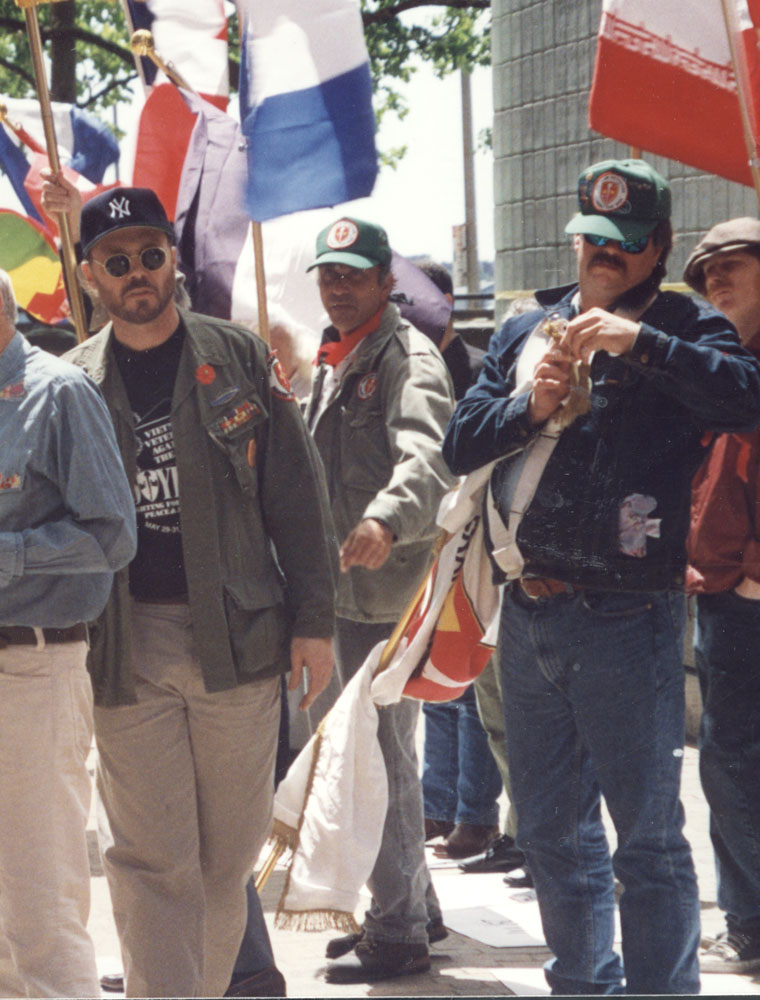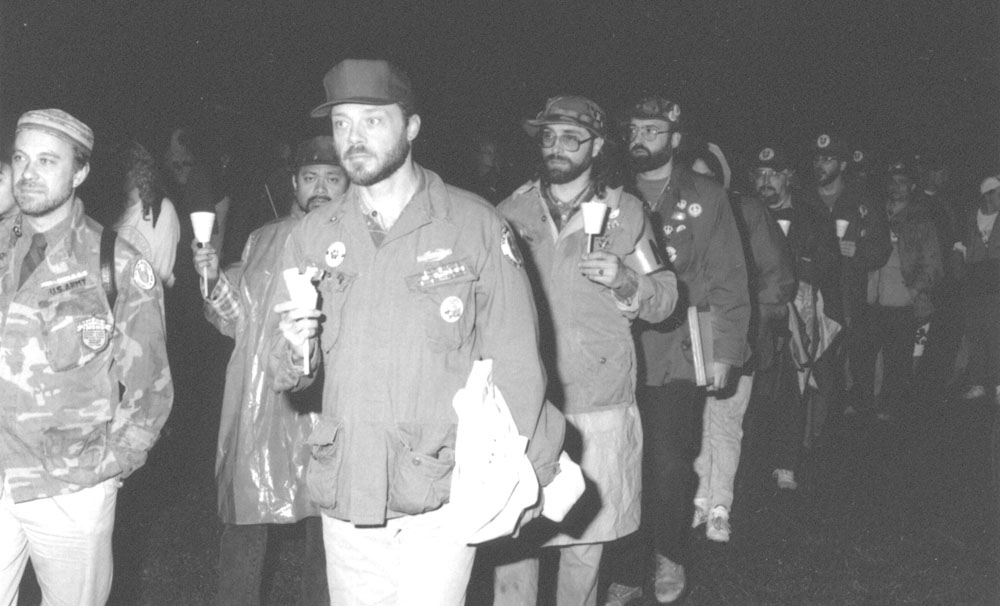 Download PDF of this full issue: v49n1.pdf (28 MB)
Download PDF of this full issue: v49n1.pdf (28 MB)From Vietnam Veterans Against the War, http://www.vvaw.org/veteran/article/?id=3742
 Download PDF of this full issue: v49n1.pdf (28 MB) Download PDF of this full issue: v49n1.pdf (28 MB) |
Excerpt from Winter Soldiers: An Oral History of the Vietnam Veterans Against the War by Richard Stacewicz Pages 56-58
Dave Cline was drafted into the Army in January 1967 and was sent to Vietnam in July of that year. He remained there until December 1967, when he was wounded for the second time and was sent back to the United States.

|
|
Dave Cline, Louie DeBenedette, and Bill Davis at VVAW's 25th Anniversary event in New York City, 1992. |
I was born in Buffalo, New York, grew up there, and then moved to the suburbs outside of Buffalo. I joined the Boy Scouts, church choir, all that stuff. My parents were just regular people, German and Irish background. They went to church - Lutheran church, Evangelical and Reformed.
My father was a World War II veteran. After World War II, they encouraged a lot of people coming home to start their own businesses because they had a lot of these loans. He started a business where they'd take these treadle sewing machines and put them in a box - you know, a carrying case - and make them electric sewing machines. He used to travel all up and down western New York and northern Pennsylvania doing that, and then that went bankrupt. He went back to working in the auto plants and the steel mills. He was involved in organizing the UAW-CIO prior to the war, when he was a machinist in Buffalo. He's always been a unionist.
Prior to going into the military, I didn't pay much attention to politics, [but] I had some awareness of what was going on. There was really not too much talk of politics in my household. The only time I can remember politics being discussed at any time was when Eisenhower ran for president. My father was big on him; I think that had to do with the World War II thing, You know - a lot of guys got behind Eisenhower because he had been the commander in the war.
We used to have arguments a lot with my father around racial issues, because our family had moved from Buffalo to the suburb of Eden. He wasn't a Klansman, but he reflected a lot of the prejudices that a lot of people reflected at that time. The area had been a German area, and it turned to black. A lot of people would say, "Look how the blacks are wrecking the area" and stuff like that..
I was aware of the civil rights movement and sympathetic to the efforts of the civil rights movement. I never was involved in anything, but I was aware of the activities. They had the freedom summers, and people were going.
What made you sympathetic to the civil rights movement?
When I was a little kid in Buffalo, I had contact with black people. Also, where I lived was near an Indian reservation. I had two girlfriends who were Native American women, and I used to catch a lot of flak from my friends for going out with Indian women. It was not black, but it was prejudice, you know. I used to look at it like this: I got a girlfriend, I'm getting laid, and these guys are fucking sitting home at night. [Laughs.] That's how I looked at it.
So there was that connection, but I think it was the basic appeal to justice that anyone can identify with if you don't have an emotional attachment to racism. There was a positive thrust of fighting for what the ideals of America are supposed to be—you know, freedom and all that good stuff. You've got to remember that in them days, Kennedy and all this stuff is coming up. All of that was putting out a sense of a movement to fulfill ideals or fulfill dreams. There was a sentiment out there, even in Bob Dylan's songs.
When I was sixteen, my brother and I started playing guitar, and through the course of listening to music, I became aware of Bob Dylan's music. I got Freewheelin' Bob Dylan. We had our bedroom in the basement. We had the record player there. We put the record on. We're listening to him, and my brother and I say, "This guy sounds like shit, man; he can't sing for nothing." My father was upstairs yelling, "Turn that shit down." Of course, we're fighting with our father - you know, the generation gap - so we cranked it up. After that, we liked Bob Dylan. [Laughs.] Dylan's message was to question things.
Then, in the course of things, I one time had heard Dick Gregory. I think he ran for president, and he had gone around campaigning on the Peace and Freedom ticket, or something like that, and I had gone to hear him speak. He was critical of the war.
I was out of high school and working. While my parents wanted me to go to college, I really didn't lean in that direction. I really didn't have any direction in my life. I was into partying, girls, rock and roll, drinking beer, and stuff like that.
I turned twenty on January 8th. I got drafted on January 15, 1967. The reason I got drafted when I was twenty was because I got my leg broke when I was eighteen. I got hit by a car, and I had a full-length cast on it for a long time. Up in Buffalo, they were grabbing you at nineteen. I got a six-month deferment because of the broken leg. In fact, I thought the broken leg would stop me from being sent to the war because it healed slightly shorter than the other, but no such luck.
When I got drafted, I was half thinking, hoping, that we are going to Vietnam to help these people fight communist aggression. That's what it was about, fighting for people's freedom, sort of the World War II [idea] - go into France and drive out the foreigners. My father had been a vet. They looked at it as, basically, you've got to serve the country when you're drafted.
I recall thinking, I know that there's people saying it ain't right and stuff like that, but at the same time, I really didn't think that I was in a position to make that judgment. There's that tradition leaning on the one side [World War II, maleness] and then there was people saying this was fucked up on the other. I guess the tradition was stronger, or at least I deferred the decision. When I went in, I said that I don't know if it's right or wrong, but I'm going to do what you've got to do. I got myself pumped up, though. We were going over to help the people. I'm going to be the good guy. I'm going to be one of the good Americans helping the villagers and shit like that.
Copies of Winter Soldiers can be purchased through Haymarket Books at www.haymarketbooks.org/books/859-winter-soldiers.

|
| Dave Cline at Kent State 20th Anniversary march in May 1990. |